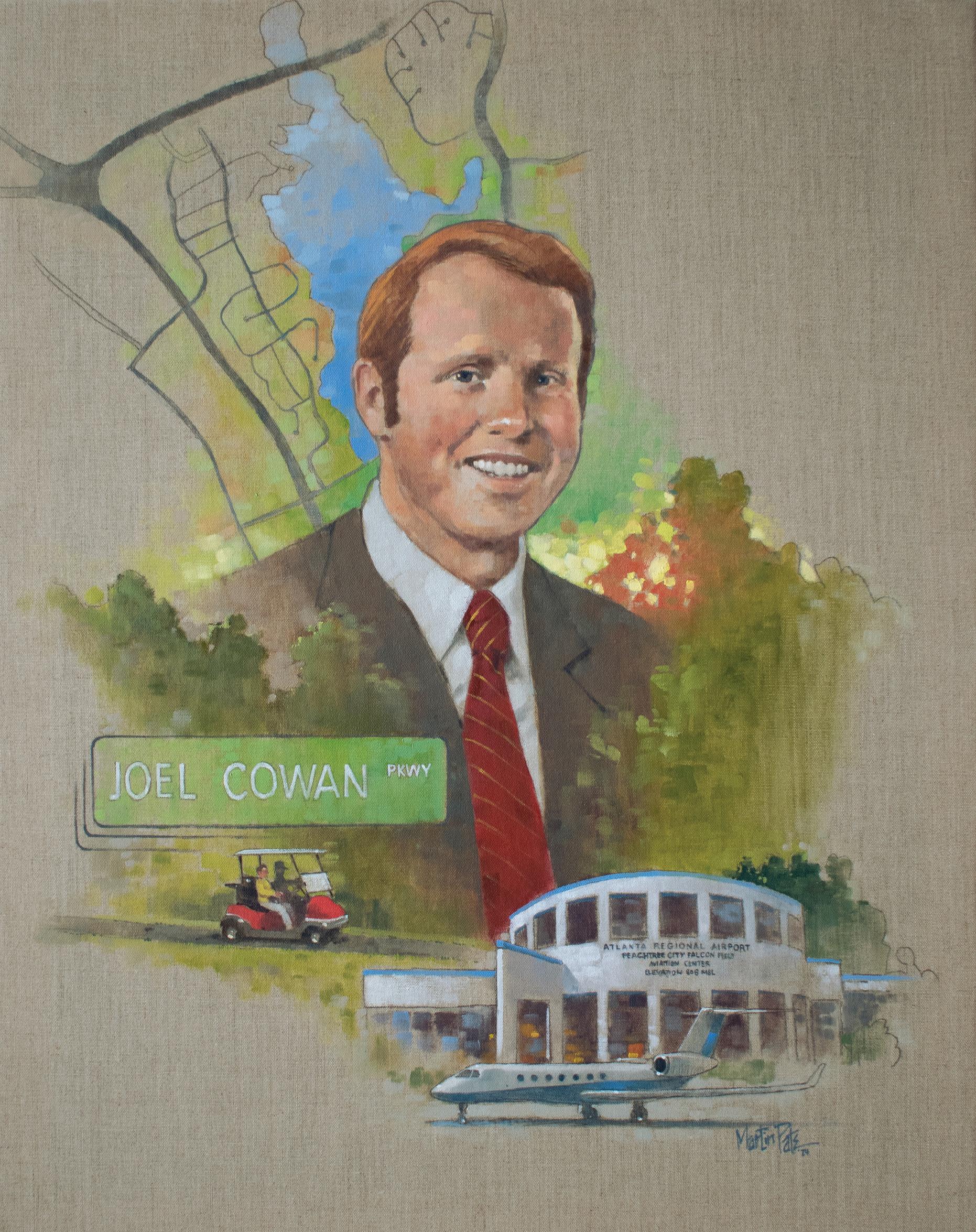Before, During, and After Peachtree City
Charles and Bernice Cowan of Cartersville, Georgia
Our story begins with the love story of Joel Cowan’s parents. Charles Cowan grew up on a farm near Conyers, Georgia, and Bernice Kemp was the daughter of the town doctor in Senoia, Georgia. Charles met and married Bernice in the middle of the Great Depression on June 26, 1930. They were both working for the Golden Eagle automotive company and living in the West End section of Atlanta. They were sent to Cartersville to close a company and ended up staying. At that time, Tom Criswell of Rome Georgia offered to sell them a failing junk yard-used auto parts business in Cartersville for $110. Then Charles and Bernice bought a 1928 wrecked Chevrolet for $10. The Chevrolet as Bernice described “was wrecked beyond repair.” They took it apart, “piece by piece and put the pieces in a bin.”
Cartersville was a small, rural town in north central Georgia on US 41 between Atlanta and Chattanooga. In 1930 there were only 6,000 people in Cartersville with only 7,000 in Bartow County. Their auto parts company expanded to include a Plymouth dealership.
Their first son, Charles Jr., was born on December 21, 1933; followed by Joel on June 23, 1936; and John on September 6, 1942. By 1937 the Cowans moved into a new house on South Avenue in Cartersville. When Joel was 9 years old the family purchased a 300-acre Hereford cattle farm on Rome Road, outside of Cartersville.
Growing Up in the Small Town of Cartersville Georgia, 1945-1955
In many ways the Cowan’s were a typical rural Southern family, with the Presbyterian church and public school being their main source of community connection. As the boys grew older, they participated in high school athletic programs. The Cowan family did well in those early years taking vacations in Florida, and Charles Sr. became interested in local politics. Summers were spent on the farm. That helped shape Joel Cowan’s sense of self-worth and how to manage people, because as he said, “It wasn’t long before workers on the farm were asking me questions about what to do or how to do it—just because I was the boss’s son.”
Driving a tractor was fun at 12 years, which led to driving a car. Joel’s dad promised him a car of his own at 16 years old if he would not smoke cigarettes nor drink hard liquor. He got the car and never smoked nor drank hard liquor (until he was 24).
Joel also was an Explorer Scout, and in 1951 he attended the Scout World Jamboree in Bad Ischl, Australia. He recalls that he was a patrol leader and had to take on a lot of responsibly for his scouts from Georgia. “Mainly because I was taller than the others,” he said.
| PEACHTREE CITY MAGAZINE | SPECIAL EDITION | 1
About the Joel Cowan Portrait
President
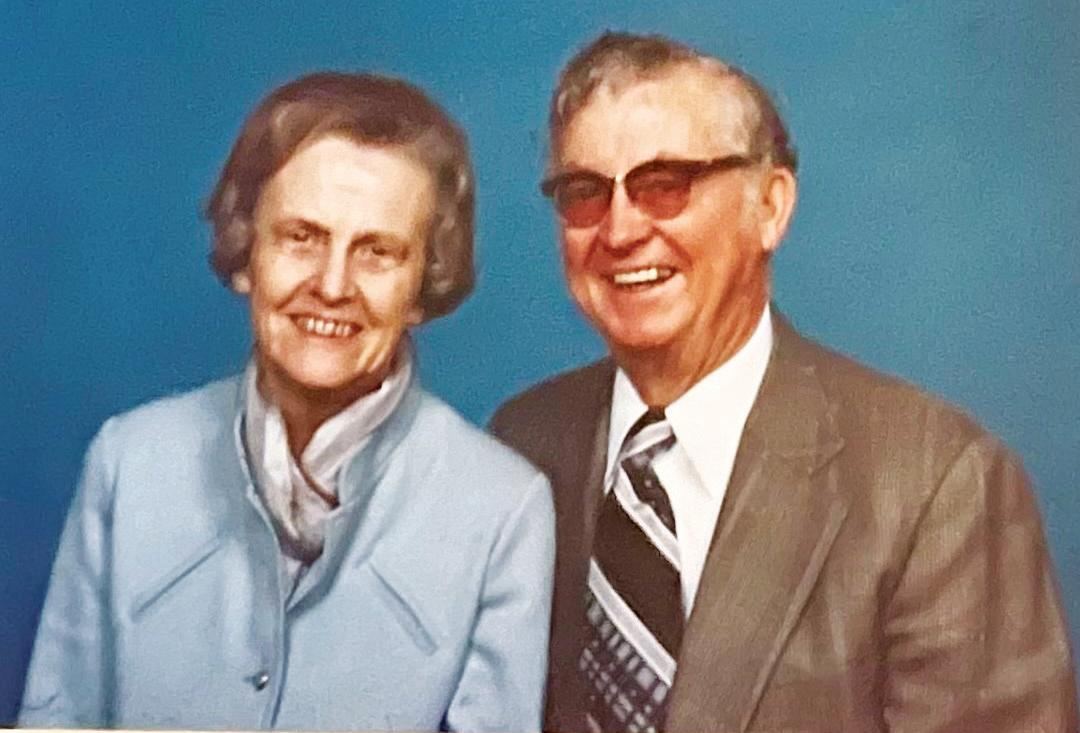
In his Senior year at Cartersville High, Joel was a leader of his class. He was President of High Y (YMCA) Club, and President of the “C” Club (Varsity letter required). He was elected President of the Senior Class and Most Popular Boy that year. In sports, he was first string on the basketball team and co-captain of the football team of which a future governor of Georgia, Joe Frank Harris, was quarterback.
Georgia Tech: A“ hell-of-a-engineer” and ATO Brother, 1954-1958
In 1954, Joel entered Georgia Tech, following in the footsteps of his older brother, Charles Jr. Joel also enrolled in the Industrial Management Program at Georgia Tech only 40 miles from Cartersville, so he drove the car his dad had given to him.
During the first two years of college he lived in Smith Hall, moving into the ATO house for his junior year (1956-1957). During those years, he continued attending regular drills of the Air National Guard which he had joined while in high school. Because of a knee injury from high school football, he could not play college sports. Academically, he enjoyed the courses in architecture and, in particular, a law course taught by a sitting judge, Judge George Aldrich.
While at Georgia Tech, Joel learned to fly a piper cub airplane at Parkaire, a small airport east of Marietta. At that time, he had his first solo flight, but he did not get his private pilot’s license. Joel’s knowledge of small planes and airports was important when he was arranging James Riley’s first visit to see Peachtree City, and later during the development of Falcon Field, Peachtree City’s first airport.
Joel Cowan met “Geri,” Geraldine Mathews, at an ATO party. She had recently won the title of “Miss Lockheed” which is where she worked as a secretary. Lockheed was at Dobbins Air Force Base. Joel arrived at the party in his Air National Guard uniform, but Geri was with another guy. Later an ATO brother matched them for a “blind date.” They married on December 21, 1957, in his Senior year.
In July 1957, Joel was hired by his fraternity brother’s dad, Peter Knox, Jr., who was president of a newly formed company, the Fayette County Development Corporation.
Two Decades Developing Peachtree City 1956-1976
Peter Knox, Jr., Willard Byrd, and the Fayette County Development Corporation
On June 6, 1956, unknown to Joel Cowan who was finishing his sophomore year, Willard Byrd and Peter Knox, Jr., father of Joel’s fraternity brother Pete Knox III, met and discussed the idea of building a “New Town” in the western part of Fayette County.
Peter Knox, Jr., using Willard Byrd’s plan, sold $150,000 of stock to 7 personal friends in New York, Augusta, Macon, and Atlanta. Short of cash, in 1957, the FCDC decided to sell another $150,000 in a public offering, which only sold $50,000—they were short $100,000.
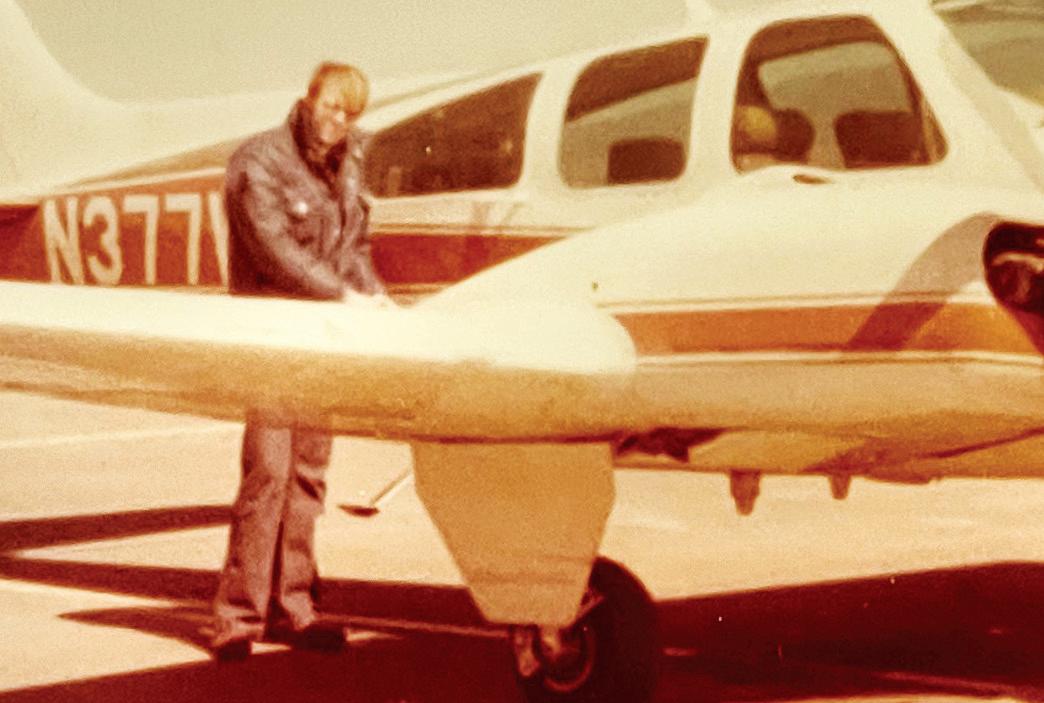
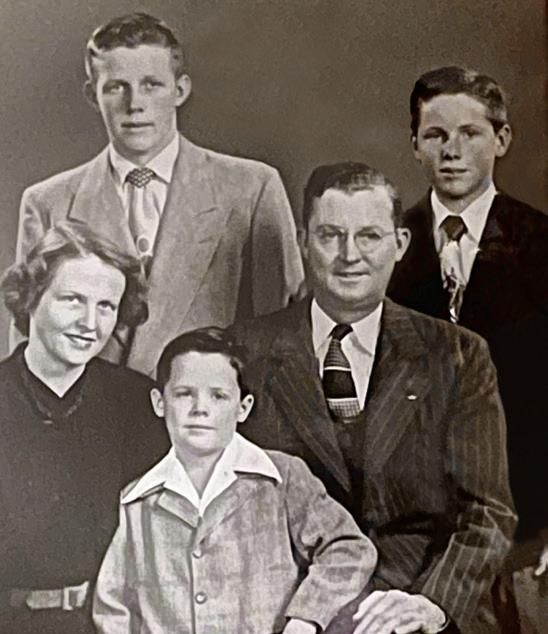
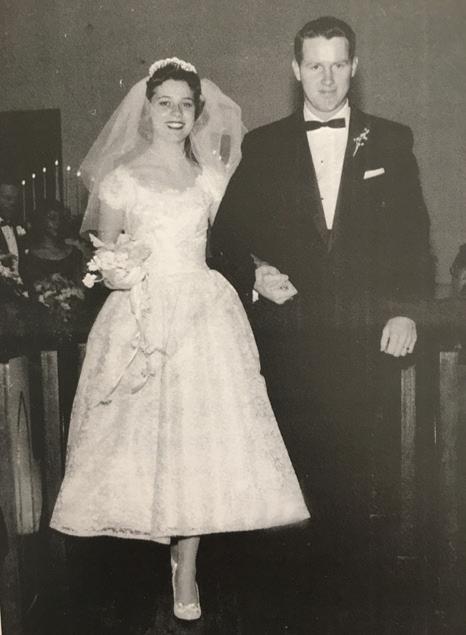
Joel Cowan Reads about Public Stock Offering in the Atlanta Newspaper, May 1957
In May 1957, Joel Cowan read an article on the front page of the Atlanta Journal about Peter Knox, Jr. offering stock in the Fayette County Development Corporation to build a New Town in Fayette County. It happened that this man was the father of his fraternity brother.
Two weeks later, Joel, the small-town boy, was very impressed by the private dining room with white tablecloths on the 5th floor of the Atlanta Athletic Club, and in June Mr. Pete offered him a job in his Senior year. Because they were broke, Mr. Pete explained that Joel would not be paid a salary. However, they would give him a small apartment and a company telephone. They would pay his expenses to visit the property as needed “to put out fires” and to further build relationships with the locals.
Joel Cowan Begins Working with FCDC, August 1957
In August 1957, Cowan attended his first FCDC Board of Directors meeting. At that time he was given a list of 44 contracts for land, 27 partially paid, owing $128,000, and 14 tracts agreed to but not closed, which would cost an additional $152,770. His job from then on was to manage these contracts and negotiate new purchases.
Later Cowan met with Earl Denny, a real estate broker who had brought the original listings to Mr. Pete. Earl Denny suggested that Joel meet Floy Farr who managed the Redwine Bank in Tyrone where the FCDC had an account.
Cowan Goes to Work, finishes his Senior Year, Gets Married, and Graduates, 1958.
As promised by the FCDC, Joel Cowan moved out of the ATO Fraternity House and into a small apartment. Cowan continued his studies at Georgia Tech, but time was taken out on
2 | PEACHTREE CITY MAGAZINE | SPECIAL EDITION | “Like us” on the Peachtree City Magazine & App facebook pages G G
Bernice and Charles Cowan
Joel Cowan belonged to the Air National Guard.
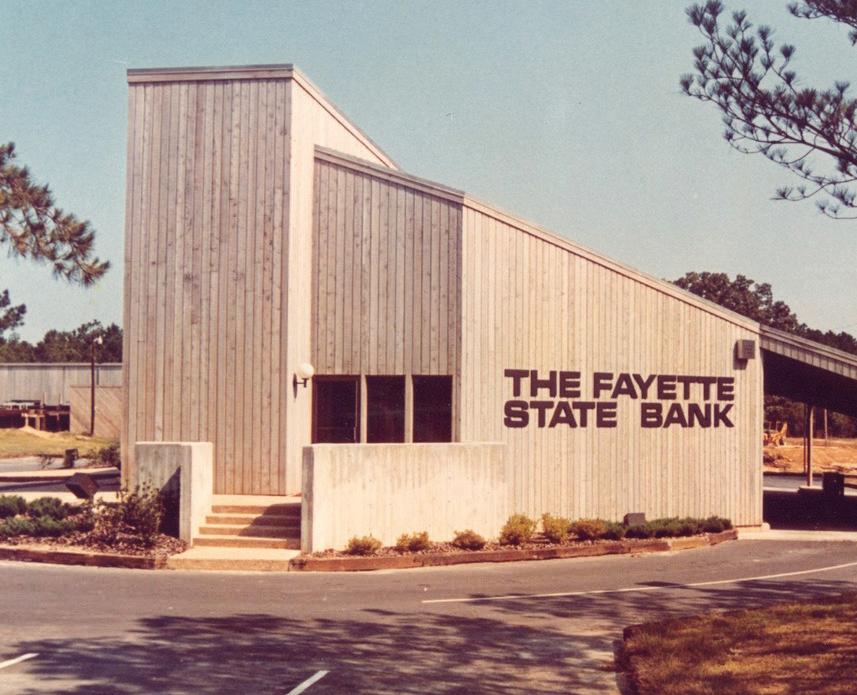
December 21, 1957 to marry Geraldine “Geri” Matthews. Floy Farr would become the key to renewing the problem accounts and negotiating the final land purchases. Farr also introduced Cowan to Bob Huddleston who owned or held mortgages on about 3,000 acres strategically located in the area of the planned New Town. The original purchase price was about $35 per acre.
During his senior year, Joel Cowan fell in love with the project, but when graduation came in June 1958, the company was so deep in debt that they had no cash and a huge amount of debt.
A New Job with Knox Homes/Peter Knox Jr. Mentor/Networking, June 1958
Since FCDC was broke they paid Joel by giving him 60 acres of land in the New Town, but Mr. Pete hired him to work in his other company, Knox Homes, for $600 per month. While working during the day at Knox Homes’ office in downtown Atlanta, Cowan was allowed to try to find a buyer for the land by working after hours and networking on his own time.
Networking Paid Off — A Draft Charter/A Name for the City
In November and December 1958, Cowan needed a city charter from the State of Georgia that would allow the city to be independent of rules and regulations imposed by the Fayette County government or by the City of Fayetteville. Ex-Knox attorney, Henry Neal, drafted the Charter by copying similar charters from law books. Joel Cowan said, “It was Willard Byrd’s idea to name the city “Peachtree City.”
Local builder Huie Bray, a personal friend, built Cowan a 1,000-square-foot Knox prefab home in 30 days so he could move in before December 31, 1958.
Prospective Buyer
In February 1959, the networking paid off! Through a network of friends, Cowan contacted James F. Riley, VP Phipps/Bessemer Securities Corporation in New York city. When Cowan spoke with James Riley on the phone, Cowan told him that FCDC had 12,000 acres of raw timberland to sell. Riley replied that he would not make the trip to Atlanta
unless he had a firm offer in writing.
Cowan excitedly called Mr. Pete, who was in the Knox office in Thomson, Georgia, and told Mr. Pete that he did not know a price to quote. Mr. Pete’s curt reply was, “Joel, you have carte blanche to deal with them.” Joel remembers that he needed to look up carte blanche in the dictionary before preparing a formal offer at $225 per acre equal to $2,700,000. (Editor’s Note: Joel wasn’t taking a big chance since the average price that FCDC was paying came to less than $100 per acre).
Joel Cowan Makes the Presentation of a Lifetime to James Riley, February 1959
Cowan’s sales presentation to James Riley included a flight, in a small private plane, from Fulton County Airport to the property for a bird’s eye view. Then Cowan, using Floy Farr’s Ford, drove Riley down Highway 74 to Highway 54. Of course, the land was just woodland and trees with its value being 12,000 acres within 30 miles of the airport.
James Riley was very impressed by the young 22-yearold Cowan and asked that he personally meet him the next day, and drive him from Griffin to Newnan.
During Riley’s visit to the area, Joel shared the vision for the New Town. Riley became interested in the idea and negotiations changed from the sale of raw timberland to the vision first discussed by Knox, Jr. and Byrd.
Joel persuaded Grady Huddleston, son of Mr. Bob Huddleston, and the state representative to introduce the bill HR 242 in the 1959 session.
Governor Ernest Vandiver signed HR 242 Charter for City of Peachtree City, March 9, 1959.
Phipps/Bessemer Makes Counter Offer to Form a New Debt Free Company, May 1959
Mr. Riley asked Joel to present a two-prong deal to the FCDC. First, Bessemer/Phipps would buy outright all of the outlying land that was years away from development. Those funds would pay off all of FCDC’s debt. Second, they would
fund a new company and pay $435,000 to provide working capital to the new company. Phipps/Bessemer would receive 51% of the stock and leave the original investors with 49% of the stock and no debt.
On July 30, 1959, the joint venture company “Peachtree Corp of Georgia” was thus created, and 23 year old Joel Cowan was made President and CEO with Peter Knox, Jr. Chairman of the Board.
On the same day, July 30, as the new corporation was formed, Joel Cowan Jr. was born in Piedmont Hospital in Atlanta. Joel Jr. was the first child born whose parents lived in the new city. Joel and Geraldine Cowan would have two other children, Mark K. Cowan, born in January 1961, and Jennifer Cowan, born in August 1964.
Joel Cowan is Mayor of Peachtree City and Manager of the Development Company Phipps/ Bessemer, January 1962-1969
In January 1962, Joel Cowan, President of Peachtree Corp of Georgia negotiated with Mr. Pete Knox Jr., representing the FCDC. Bessemer would buy out all of the remaining FCDC stock for 2.5 times their original investment leaving Bessemer with 100% ownership.
In 1964 Bessemer/Cowan/Farr purchased the Redwine Bank of Tyrone, and it became the Fayette State Bank with Joel Cowan, Chairman, and Floy Farr, President. In February 1965, it moved to Peachtree City; and in 1973, it moved to the Aberdeen Shopping Center.
The Transition Years
Joel Cowan is President of Phipps Land Company, Inc., January 1969-1976
In 1969 Bessemer created the Phipps Land Company as a wholly owned subsidiary of Bessemer Securities, and Joel Cowan was made President and CEO. Cowan continued overseeing the development of the Peachtree City project and began preparation to sell it.
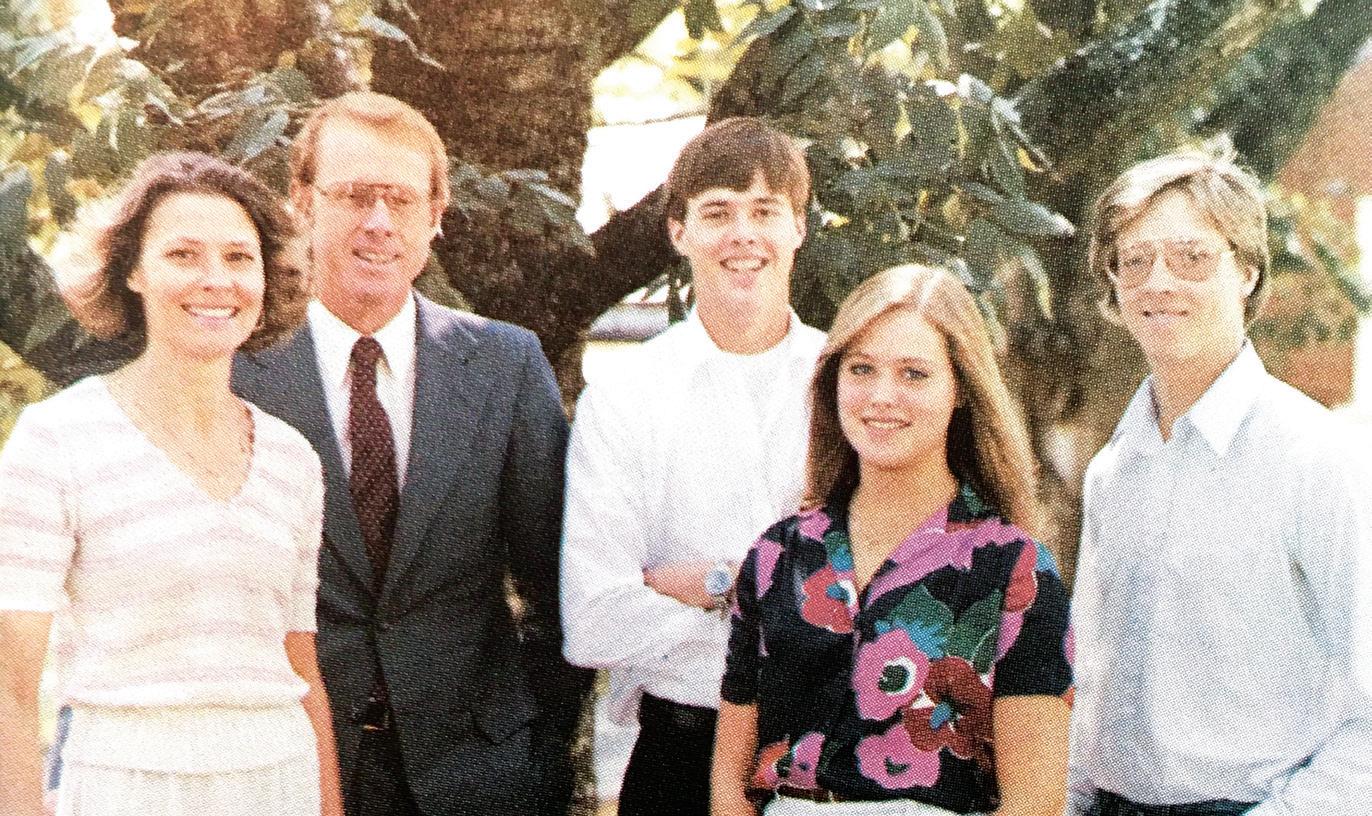
| PEACHTREE CITY MAGAZINE | SPECIAL EDITION | 3


Cowan conceived of the development of Phipps Plaza and secured the lease to Sak’s 5th Avenue. Phipps Plaza opened in 1969 and became one of the most prestigious shopping centers in the southeastern states containing major tenants. Later, Cowan sold Phipps Plaza to the Burda Company of West Germany.
Also, during that period Cowan oversaw the development of Snapfinger Woods in Atlanta, and Palmetto Dunes Resort in Hilton Head Island, South Carolina.
Among the large projects that were being built in Peachtree City during that time were: Bessemer donated 100 acres of land in 1966 and built Falcon Field; in 1967 Phipps Land donated land and built and leased a non-segregated school, Peachtree City Elementary; and in 1968 Flat Creek Country Club opened on Labor Day.
Also, during that period Cowan hired nationally respected Arthur Little and Richard Browne & Associates to prepare a forward-looking plan for the Peachtree City property.
In 1972 Phipps Land created a subsidiary, Garden Cities Corporation, which received a loan of $15 million from Equitable Assurance which was guaranteed by land owned by Phipps Land/Bessemer.
In 1973 Equitable became the de facto owner of Peachtree City property, and Joel Cowan remained president of Phipps Land as he turned more attention to the Phipps Plaza and Palmetto Dunes properties and ultimately resigned his position to begin his own company.
Joel Cowan Begins His Next Career as an Owner, Entrepreneur, Professor, and Philanthropist
When his obligation was complete in 1976, Joel Cowan resigned his position with the Phipps organization and started his own company, Cowan and Associates. In 1980, he formed a holding company called FSB Bancorp to bring together his banking interests, including the Fayette State Bank and the newly acquired Habersham Savings Bank.
In 1986, Habersham & Cowan was created to serve as General Partner for a family limited partnership. This company currently holds title to various shareholdings and real estate. It also conducts advisory services through Joel Cowan.
State Services
In 1981, Joel Cowan served as the Campaign Chairman for Joe Frank Harris when Harris ran for Governor and then as the Chief of Staff for Governor Harris for two terms beginning in 1983 when he took office.
While working as Chief of Staff for Governor Joe Frank Harris from 1983 through
1990, Joel Cowan lead or worked on several important governmental authorities and boards of directors of multiple businesses and schools. In particular he was Chair of the Governor’s Growth Strategies Commission, and Chairman of the Board of Directors of Georgia Department of Community Affairs. In 1989 he was presented the “Governor’s Award for Excellence in Water Management Stewardship for Outstanding Achievement in Promoting Effective Management of Georgia’s Water Resources.” He was also Vice Chairman of the MLK Jr. State Holiday Commission.
For Governor Barnes, Joel Cowan continued the previous efforts to reform growth in Georgia and was appointed founding Chairman of Georgia Regional Transportation Authority. That was followed with founding Chairman of the Metropolitan Atlanta Water Planning District.
Non-Profit Activities on Education and Leadership Training
Cowan currently serves as an Adjunct Professor in the MBA program at the Georgia Institute of Technology where he specializes in issues of the emerging world. He founded and co-endowed the “Cowan-Turner Chair of Servant Leadership,” which is a core course at Tech today. He is on the Board of Councilors of the Carter Center and was a director of the EastWest Institute in New York for 20 years. This led to numerous human rights and coaching for economic developments in Central Asia, including Afghanistan and Ukraine.
Joel Cowan is a trustee emeritus of the Georgia Tech Foundation and is the Past Chair of the Rabun Gap-Nacoochee School Board of Trustees, multiple board positions at his alma mater Georgia Tech, and a member of the Georgia Board of Regents.
Many thanks to everyone who fact checked, and edited this article, including Geri and Joel Cowan, Iola Snow, Lee Eltzroth, President of Friends of the Library, and my staff. Acknowledging the sources of important information from Bernice Cowan’s Journal; the Joel Cowan “Timeline of Peachtree City”; the Story of the Development of Peachtree City”; the Joel Cowan History Room in the Peachtree City Library; Fayette Historical Society and the North Carolina State University Library Research Center.
This article was originally published in full manuscript form and can be found at www.peachtreecitymagazine.com/history.
4 | PEACHTREE CITY MAGAZINE | SPECIAL EDITION | “Like us” on the Peachtree City Magazine & App facebook pages G G
Joel Cowan developed and opened Phipps Plaza in 1969. Joel Cowan, President of Phipps Land Corporation, purchased and developed Palmetto Dunes Resort of Hilton Head Island, South Carolina in the early 1970s.
